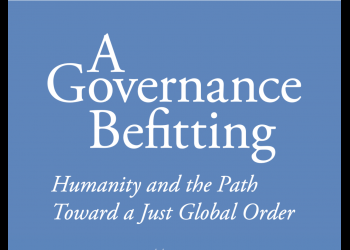A Governance Befitting – Implications for Europe
Maximillian Afnan from the London School of Economics offers thoughts on the implications for Europe of a recent statement from the Baha’i International Community about the future of global governance.
The 75th anniversary of the establishment of the United Nations (UN), a milestone reached against the background of a devastating global health crisis, is spurring conversations about the purpose and design of arrangements for international cooperation. The Baha’i International Community (BIC) has released a statement marking the occasion, highlighting that the present anniversary provides an “opportune moment to begin building consensus about how the international community can better organize itself, and to consider what will be the standards by which to measure progress”. The statement addresses a global audience, but naturally carries significant implications for Europe. Of these, at least three stand out.
First and foremost, the statement highlights the need for a deeper appreciation of the ways in which Europe is part of an organic, interconnected global whole. “True acknowledgement of global interdependence” it says “requires genuine concern for all, without distinction. Deceptively simple, this principle implies a profound reordering of priorities. Too often, advancement of the common good is approached as a secondary objective—commendable, but to be pursued only after other, narrower national interests have been secured”. An important question for European institutions, then, is how to instantiate this “profound reordering of priorities” in practice. In this regard, the statement suggests that policymakers will increasingly have to ask the question: “What will be the global implications of domestic policies?”. On policy issues as diverse as technology, environmental protection and agriculture, decisions made within Europe’s borders have profound effects on other regions of the world, just as decisions made elsewhere influence the lives of its population. Thus, the reflex to analyse the impact of a given policy on other parts of the world must become an integral part of the policy making and evaluation process, both because it is a moral imperative, and because it is a pragmatic necessity.
A second, related consideration is that the international order must be ‘global’ not only in its scope, but also in its design. The BIC’s statement highlights the pressing need for a shared global moral framework within which supranational political discussion can be conducted. As the statement notes, there is already some measure of agreement on aspects of this framework, such as the universality of human rights, the importance of alleviating extreme poverty, and the need to live within environmentally sustainable limits. But there is clearly much further to go. One important consideration in this connection is that a flourishing global order will not represent the universalisation of any particular political culture. Instead, it will only emerge as concepts and ideas from all parts of the world - including those which have been historically marginalised - are permitted to shape the construction of mankind’s shared future. This implies a willingness of different political cultures and traditions of thought to approach the construction of global order with a posture of humility, conscious that different models of political, legal and social organisation are – as the statement puts it – “sources of potential insight into new solutions”, not “points of friction”.
Third, the statement notes that “in recent years, reasoned critique of multilateral arrangements has, at times, been eclipsed by rejection of the very idea of a rules-based international order”. It is clear that mankind’s long term future depends on the construction of a shared global moral framework, upheld by strong international institutions. Constructing such a global order in a way that respects the demands of social, cultural and societal diversity will require a global learning process which draws on the practical experience of human communities in synthesising the demands of unity and diversity. As the EU gains insights into the challenges associated with harmonising these twin values, such insights, if offered in a posture of learning to a broader global conversation, could be an interesting contribution to this defining question of the current century.
Maximillian Afnan
London School of Economics and Political Science
